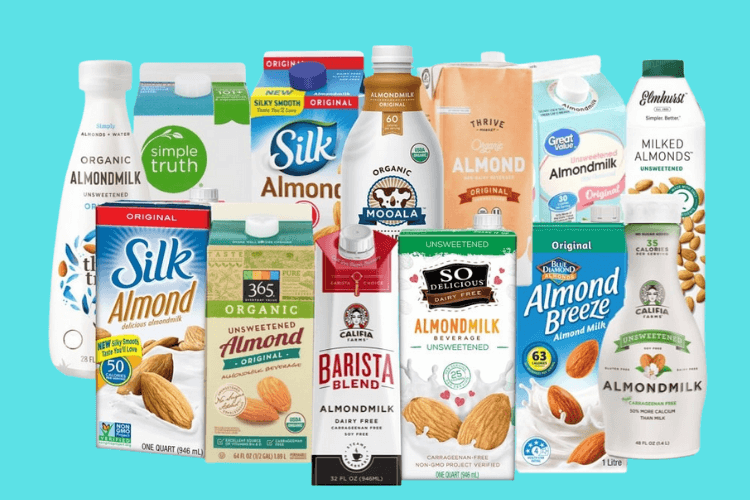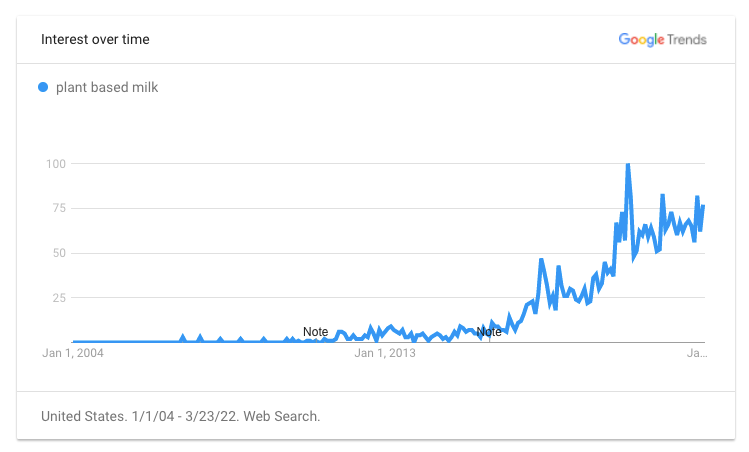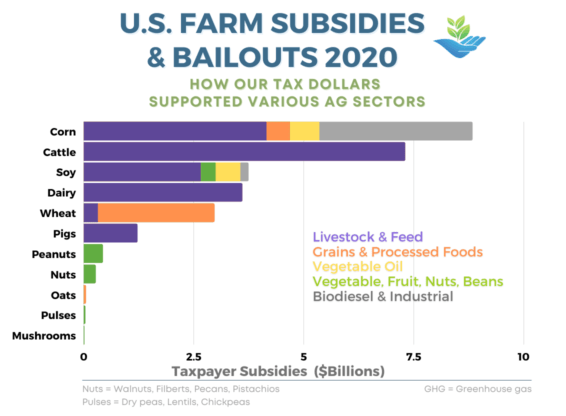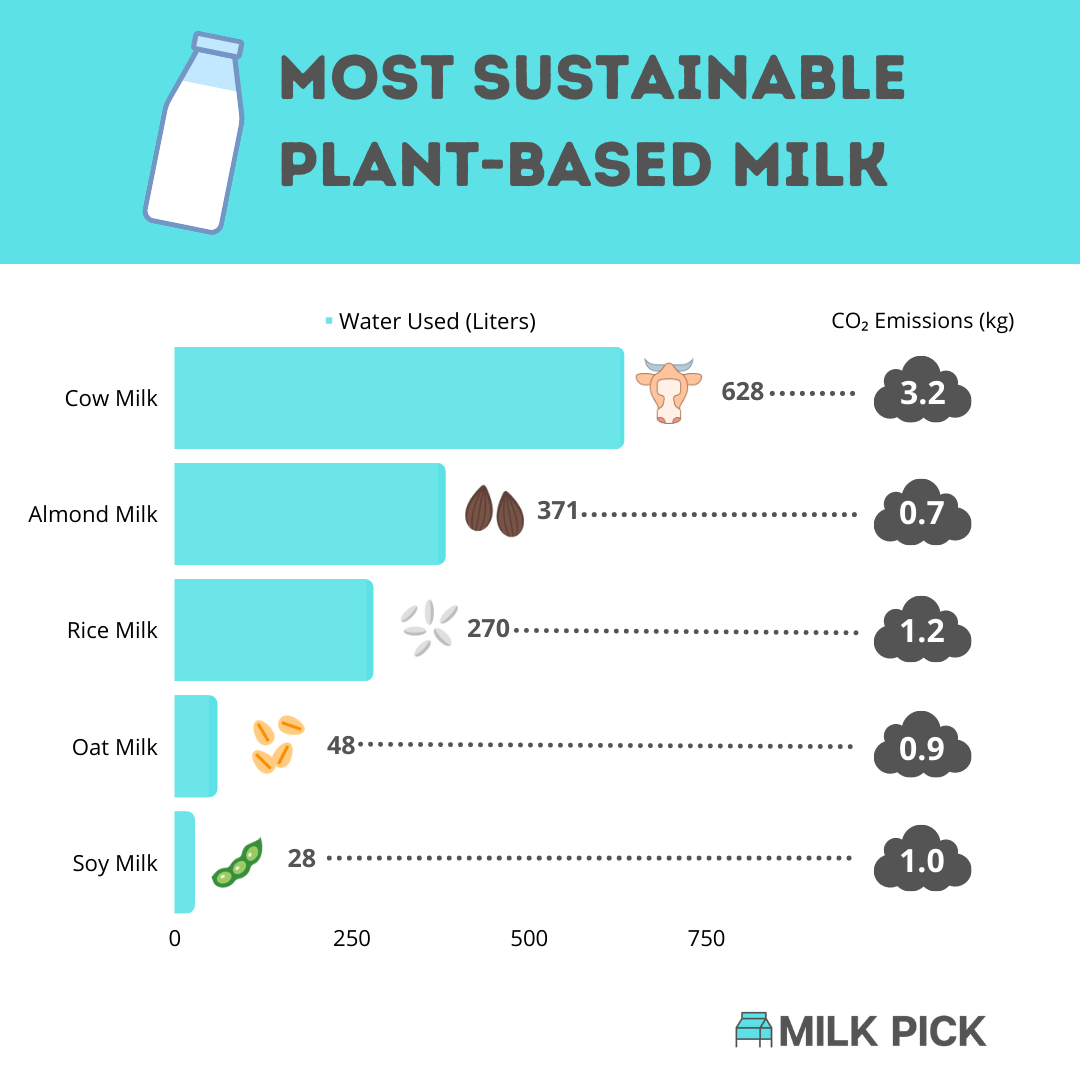Are you considering joining the plant-based milk movement but aren’t quite sure if it’s worth it for your wallet?
Plant-based milk tends to be more expensive than animal milk because of the research and development required within the plant-based milk industry, the processes to manufacture the milk, the packaging, and the fact that animal milk is usually subsidized by governments.
Read on for some simple explanations for why plant-based milk tends to be more expensive than animal milk. We’ll debunk the question so you can make the best choice for you next time you’re strolling the aisles.
Why Plant-Based Milk is More Expensive Than Dairy Milk
First things first—there are various types of plant-based milk. The prices of these different types vary depending on the brand, quality of ingredients, the processes the company uses to manufacture the milk, and so forth.
As a result, you'll probably notice that two different brands charge completely different prices for the same type of non-dairy milk.
However, generally speaking, plant-based milk as a whole is more expensive than dairy.
Here's why:
1. More Variety
Have you noticed that when the media talks about inflation and the costs of groceries, one of the products they always mention is the cost of milk?
But how often do you hear people complain about the price of almond milk going up?
The reasoning behind this is that most of the dairy milk you see in stores comes from a few large corporations, and that number is constantly shrinking as more dairy farms go out of business.
As a result, you won't notice a big shift in the cost of dairy milk from store to store. The price you pay for whole milk at one store will be fairly close to the price you pay at another.
And most people don't go searching for a particular "whole milk brand" when they're at the store.
With plant-based milk however, things are different.

There are a ton of brands selling a ton of different types of milk, with new ones popping up all the time.
That can create more demand among consumers. When you find a brand of almond milk you really like, you're more inclined to pay more for it, particularly if it's only available at a few select stores.
2. Research & Development
Another reason we have attributed to plant-based milk’s higher price is the need for research and development (R&D) within the plant-based milk industry.
Research and development is a fundamental part of any “new to market” product.
Some plant-based milk types have been around for quite a while, but the industry only really started to boom in recent years, as noted by data from Google on the search trend for "plant based milk" over the past couple decades.

Companies spend a significant share of their capital on trying to find more efficient methods to manufacture the milk, to grow the ingredients, and to power the facilities.
They also invest resources in improving the taste of the milk and expanding the products they offer.
Animal milk comes from a tried and true, age-old industry that therefore doesn’t need to invest in R&D to the same extent that the newer plant-based milk industry does.
This extra expenditure is reflected in the higher plant-based milk prices.
3. The Manufacturing Process
Another reason plant-based milk is more expensive is the manufacturing process.
The animal milk manufacturing costs have reached something called “economies of scale” where they produce at such volumes that the cost per carton of milk is extremely low.
As most plant-based milk companies are much smaller than animal ones, they have higher manufacturing costs per item produced.
This also explains why animal milk packaging costs producers less than plant-based packaging which is, again, reflected in a higher price at the grocery store.
Related: Why is Oat Milk So Expensive?
4. The Dairy Industry Is Subsidized by the Government
One of the biggest reasons plant-based milk is more expensive than dairy has is because the government subsidizes the dairy industry.
In other words, the government pays for part of the costs to produce dairy milk for farmers, which saves them a lot of money that would otherwise be pushed to the consumer.
While the government does provide subsidies for farmers who produce some of the products plant-based milk is made from (e.g. soy and nuts), farms aren't the ones producing plant-based milk.
Also, the subsidies for the most popular type of plant-based milk (nut milk) is a fraction of dairy

5. Marketing Costs
Marketing costs are another reason why certain plant-based milks are more expensive than animal milk.
The plant-based market has skyrocketed in recent years as more and more people switch to plant-based or “flexitarian” diets.
This means the market has become somewhat saturated and marketing is an essential part of any plant-based product’s business plan.
According to data from Research & Markets, the plant-based milk market is expected o grow to over $24 billion by 2024!
Whether these are billboards, television commercials, or PR events such as pop-up shops, these companies have poured an incredible amount of money into their marketing strategies to build a customer base.
Animal milk brands, on the other hand, spend very little on marketing, if any at all.
This is primarily because animal milk customers have been customers for years and thus, marketing isn’t an effective expenditure for them.
Which Plant-Based Milk Is the Most Expensive?
It's difficult to say which plant-based milk is the most expensive because the price primarily depends on the brand and different brands are sold all over the world.
However, some plant-based milk is more expensive simply because its primary ingredients are more expensive than other types.
For instance, organic plant-based milk will usually cost more than non-organic as with most organic foods.
This is because organic food is grown naturally so farmers apply less pesticides and chemicals to them to help them grow faster and bigger. Since this process takes longer, it often means the products are slightly more expensive.
Pay attention to the ingredients in your plant-based milk! Lower-priced milk can be filled low-quality ingredients or contain mostly water.
The same goes if there are additives in your plant-based milk.
For instance, some brands will market themselves as “protein” milk producers meaning they add high protein-containing ingredients to boost the protein concentration in the milk.
This will hike up the price of the milk simply because the ingredients it contains cost more.
Finally, the plant-based types of milk that have traveled a great distance to your grocery shop may be more expensive than those that were manufactured nearby.
You may spot certain plant-based milk from places like the United Kingdom or Norway. This is because these places were some of the first movers in the plant-based milk industry and thus, their products have worldwide markets.
However delicious, that extra travel may show up on your grocery bill!

Why Does Plant-Based Milk Come in Cartons and Animal Milk Come in Jugs?
An important part of the plant-based milk concept is that it is better for the environment than animal milk.
Thus, most brands will use eco-friendly packaging to sell the idea that they are an environmentally friendly product. Animal milk producers on the other hand aren't exactly known for being environmentally friendly.
Another reason the packaging is different has to do with the concept of mass production.
We previously mentioned the fact that the larger the production, the less expensive each individual product becomes, the same goes for the packaging.
Many animal milk companies have had partnerships with packaging manufacturers for decades. The plastic jug design is simple, cheap, and easy to produce on a massive scale.
This is also why the packaging of animal milk tends to stay the same year after year while plant-based milk brands will change up their packaging regularly.
Is Plant-Based Milk as Good for You as Animal Milk?
Since you're paying more for plant-based milk, you might be wondering if non-dairy milk is healthier than dairy milk.
Unfortunately, it's difficult to do a direct comparison of plant-based milk and cow milk because they have very different properties.
As previously mentioned, the plant-based milk industry is very diverse. There is oat milk, soy milk, pea milk, potato milk, almond milk, coconut milk, and many others.
On top of that, there are also plant-based milk brands with added sugar or flavors such as vanilla or banana. If you're drinking sweetened chocolate soy milk, it may be filled with more sugar than you think.
However, there are also all sorts of different types of animal milk. From skim cow’s milk to homogenous to goat’s milk and everything in between. Some are better for you than others.
Another important consideration is that everybody reacts differently to different foods.
For instance, animal milk contains lactose which can be very harmful to individuals with lactose intolerance. While soy milk could cause problems for someone with an allergy to soy.
Thus, there is no one answer to the question, “is plant-based milk as good for you as animal milk” because it depends on the type of milk and your body’s needs.
Is Plant-Based Milk Better for the Environment?
We mentioned one of the reasons plant-based milk is more expensive is because of it's environmental impact.
But is it actually better than the environment than dairy milk?
This question is another difficult one to answer simply.
Generally, plant-based milk is better for the environment because the dairy industry is notoriously hard on the planet.
This is largely due to land use as forests are chopped down to make space for cattle however, there are several other reasons such as the fact that cows burp and fart methane which is a greenhouse gas contributing to global warming.
Plant-based milk does not come from animals which makes it less hard on the environment however, some plants are better than others.
For example, almonds take way more water to grow than oats so even within the different types of plant milk, you will find some that are better for the environment than others.
Here's a look at which milks use the most water and CO₂ to produce.

While the general consensus is that non-dairy milk is better for the environment than dairy milk, producing these products still uses a substantial amount of natural resources. More info.
Non-Dairy Milk is More Expensive For a Reason
Now that you know the reasons for which plant-based milk is generally more expensive than animal milk, you can make a well-informed decision next time you’re strolling the milk aisles.
Remember that the extra couple of dollars for plant-based milk contributes to their large R&D expenditure, manufacturing processes, and packaging. While the lower cost of animal milk is often due to the fact that governments subsidize the dairy industry.
When it comes to milk, gone are the days of one or two options to choose from, so knowing the facts is essential.
